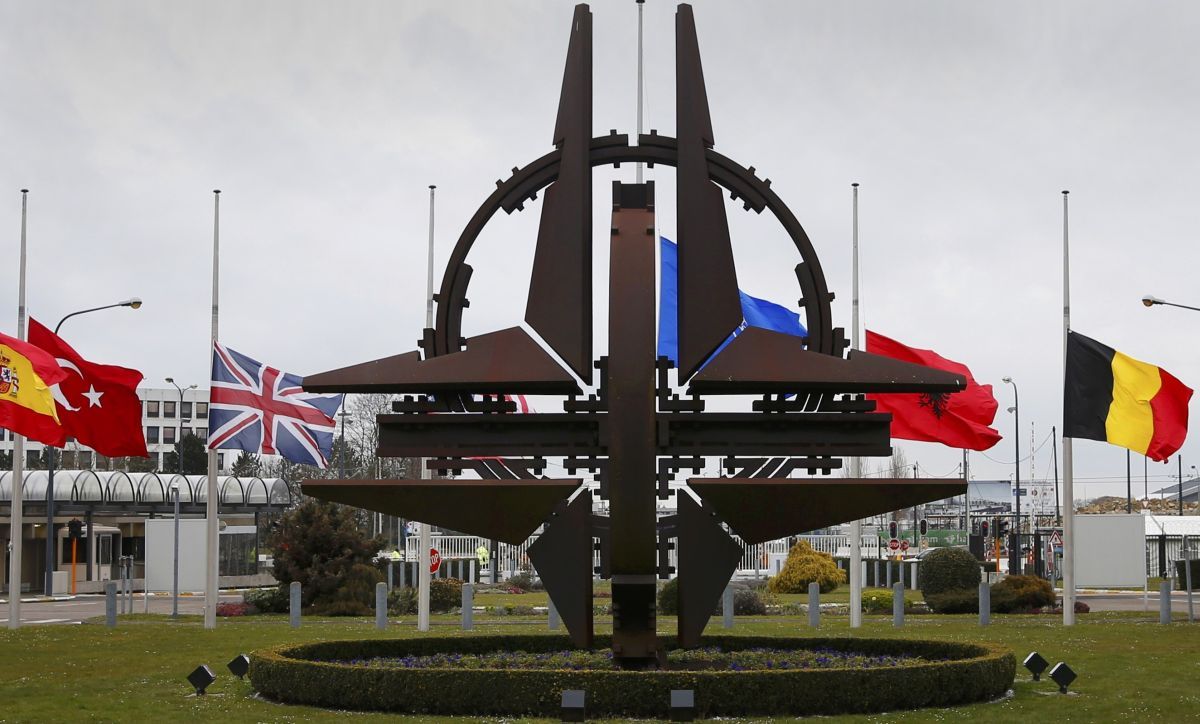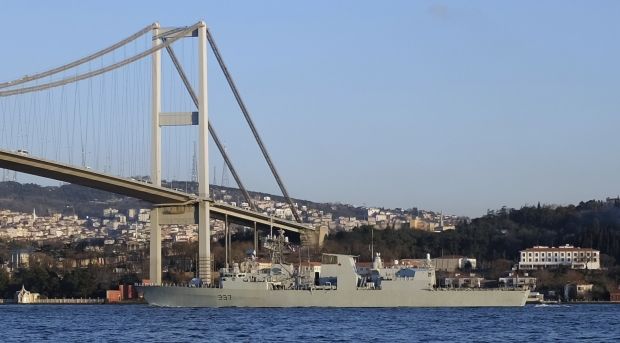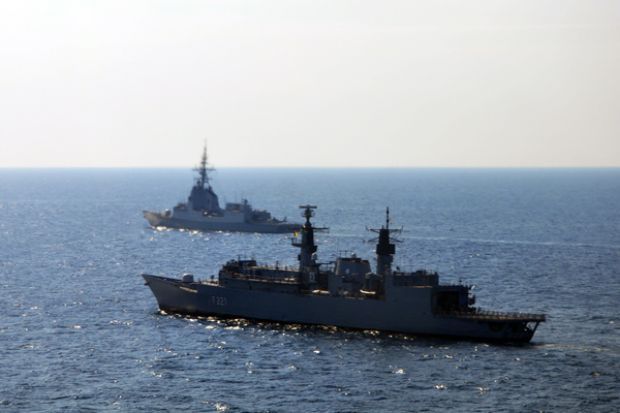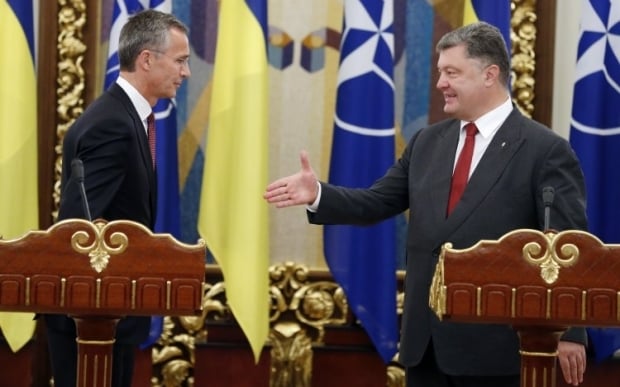
Ukraine’s creeping "entry" into NATO
Last week Ukraine, through its President, voiced its readiness to join the Black Sea fleet under NATO leadership and to set up a joint brigade the Alliance’s member states – Romania and Bulgaria. UNIAN tried to figure out the prospects for the implementation of these ideas.
The North Atlantic Treaty Alliance should assess a possibility of a "more sustainable military presence" in the Black Sea region, that’s according to Alexander Vershbow, Deputy Secretary General of NATO who addressed the Sofia (Bulgaria) meeting of the Atlantic Club in the framework of the Black Sea Security Conference.
According to Vershbow, the thing is that the Alliance has faced strategic threats from two different directions at the same time. The first is the instability of the Bloc’s southern borders that threatens to spill over into its territory in the shape of terrorism and uncontrolled migration. The second is the aggressive stance of Russia, which defies international law and the sovereignty of neighboring states. In particular, NATO concerned about the use by Russia in the occupied Crimea of the A2AD systems (Anti-Access Area-Denial), allowing, with minimal resources, to create a barrier that, for example, would make it impossible for foreign warships and submarines to get in the waters of the Black Sea.
This concern is understandable in the context of earlier statements by NATO Secretary General Jens Stoltenberg who said that NATO would continue to build up its military presence in the Black Sea. First of all, it’s about naval forces as well as reconnaissance means and those for deployment of reinforcements. But, given that the Black Sea region hosts a number of frozen conflicts and several transit routes of energy resources converge, NATO also plans to organize aerial surveillance with AWACS aircraft, based in Romania, Bulgaria, and Turkey.
In the face of the ongoing Russian aggression, in order to enhance security in the Black Sea region, Ukraine is also willing to join the flotilla led by NATO. That’s what Ukrainian President Petro Poroshenko last week said at a joint news press conference with Romanian President Klaus Werner Johannis in Bucharest: "We are considering a joint initiative on creating a Black Sea flotilla under NATO leadership in order to strengthen the Alliance's presence and enhance security in the Black Sea. Ukraine will be happy to join this initiative..."
Read alsoPoroshenko: Ukraine happy to join 'allied fleet' in Black Sea if createdIn turn, Russia's position on this issue is very simple: it will not tolerate the attempts of extra-regional powers to increase their military presence in the Black Sea. "The Black Sea is a constant, just as the countries that surround it. We know that among the Black Sea states, Bulgaria, Romania and Turkey are maritime powers. They have fleets in the Black Sea. Uniting them into the group or not – this is up to the military," said Russia's permanent representative to NATO, Alexander Grushko.

However, according to him, the Montreux Convention regime on the status of the straits of Bosporus and the Dardanelles from the Black to the Mediterranean must remain inviolable and “no attempts must be taken to change the regime in such a way as to facilitate the presence of extra-regional powers in the Black Sea."
A Freedom Flotilla
It is curious that it was Romania, who voiced the initiative to set up a Black Sea NATO flotilla. This country can hardly be called an "extra-regional power" in the Black Sea. Another thing is how seriously the Alliance will take this idea and how quickly it can be implemented. The thing is that, according to the foreign political analyst Taras Chornovil, Romania cannot boast authority among NATO member states to the level for its initiatives to be addressed by the Alliance as a priority. "However, there is a number of circumstances, which does gives hope that this initiative will be supported. First of all, there is a threatening situation in the Black Sea, the provocative behavior of the Russian armed forces and the understanding that it is better to resort to some preventive action than to randomly find a way out of the situation," he said.
Actually, any possible aggressive actions against Bulgaria or Romania will force NATO to respond. But reacting to something that has already happened is much worse than deterring potential aggression.
According to the expert, this is context, in which the creation of a combat-capable fleet in the Black Sea should be considered. "Its presence could deter any provocative actions," said Chornovil.
A military expert, director of military programs at Razumkov Center, Mykola Sungurovsky, also notes that the creation of such a fleet would help a parity balance of forces emerge in the Black Sea. And, of course, Ukraine's accession to this formation seems quite reasonable. But only in the future. Because, as of today, Ukraine doesn’t have much to offer in order to join the NATO fleet. “At the moment, we can take part in the NATO flotilla with the Ukrainian frigate Hetman Sahaidachnyi, for example,” said Sungurovsky. ‘Subsequently, if this fleet is established, I think, that NATO funding will be provided for the development of the operational capacity of such fleet. That is, Ukraine will receive additional resources for the development of its Navy.”
Problematic issues
In principle, this fleet “can be created on the basis of the already existing BLACKSEAFOR, as Petro Poroshenko mentioned. But the problem is that Russia is also a party to it,” said the expert.
However, excluding Russia from BLACKSEAFOR requires a lot of political will from other members. Besides, this would require the creation of an entirely new association under the aegis of NATO. "We need to determine why this flotilla is created, with what forces and means, what risks bears the creation of such a formation,” he said. All of this should be put on a political agenda of the Black Sea countries and, after that, at the NATO level."

In this context, Russia’s warnings considering possible establishment of such a fleet are not groundless. In other words, if we are talking about the creation of an association on the basis of the naval forces of the Black Sea states exclusively, these forces will be quite limited. If it is about attracting other NATO member states, then this issue should be resolved within the framework of the agreements on the Black Sea straits. "If the flotilla is supposed to be a permanent body, the issue should be resolved with Turkey in the framework of the agreements on the Black Sea straits. According to the Montreux Convention, ships of the non-Black Sea states can enter the Black Sea for a limited time only," said Sungurovsky.
The situation can be resolved, according to Chornovil, with additional financing from NATO aimed at building new vessels for the fleet within the Black Sea states. In particular, for Ukraine, which has for a long time has cooperated with NATO, not being a member state. In this case, "NATO wouldn’t need to ‘rip off’ an excessive amount of vessels from its fleet in the Mediterranean," and the Montreux Convention would not be compromised.
Brothers in Arms on land and at sea
As for the mutually beneficial cooperation between the Black Sea countries in general, Ukraine, Romania, and Bulgaria are also considering a possibility of setting up a joint military brigade similar to the recently created Lithuanian-Polish-Ukrainian brigade ( LITPOLUKRBRIG). "Within NATO, nobody forbids to organize such groups in the interest of regional security. This leads to greater solidarity. And if the partnership involves the non-member states, this leads to an increase in the level of trust," said Mykola Sungurovsky.
However, according to the expert, the implementation of this idea lies in the same political plain as the idea of the flotilla. "It is important that the issue of establishing a brigade not become bureaucratized. The Lithuanian-Polish-Ukrainian Brigade was being created for 12 years, and its establishment was hampered by bureaucratic procedures. The armed conflict between Ukraine and Russia has pushed to accelerate its creation," said the analyst.
According to him, today, there is a situation when the question of creating such a formation would be treated differently. Especially since Ukraine's national interests do not conflict with the interests of other countries in the Black Sea region. "We have roughly the same views on the threats and on how to prevent them. And these are, in fact, the criteria for integration," he added.

Moreover, such military partnership contributes to Ukraine gradually approaching the NATO standards.
Proper integration
As for the interests of the Alliance, setting up a joint forming by two countries in the same region is an additional opportunity to synchronize the efforts of forces, to work out various scenarios at joint exercises. Moreover, it is not so much about the Russian military aggression in Donbas and the possible escalation of the occupation forces in Crimea. It’s more about participating in peacekeeping operations in general. In particular, about the issues of fighting terrorism, countering man-made disasters, illegal migration, etc. That is, if needed, these units will already have been prepared, because the schemes and methodology of joint action will have been worked out.
Given that Ukraine is not a NATO member state and has no membership prospects in the near future, the establishment of a joint brigade is one of the options, which is fully supported by the country’s Western partners. And it would be foolish not to use this opportunity. "The brigade will have a stabilizing, positive impact on the overall security architecture in the region, allowing Ukraine to work out regional combat missions, establish closer cooperation at the level of departments and structural units of the military organization of Ukraine and NATO member states," said political expert, director of the Center for Civil Society Studies Vitaliy Kulik.
Thus, such units would be an excellent military training base for the Ukrainian army. In this regard, it should not be excluded that in the near future, the establishment of such military units with Hungary, Slovakia, and possibly the Czech Republic will also be considered.
Kostyantyn Honcharov

